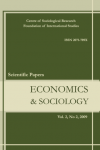SOCIAL CAPITAL IN
COOPERATIVES: A TYPOLOGY AND
INFLUENCE ON PERFORMANCE
SOCIAL CAPITAL IN
COOPERATIVES: A TYPOLOGY AND
INFLUENCE ON PERFORMANCE
Author(s): Ana María García-Pérez, Cándido Román-Cervantes, Enrique González-Dávila, Vanessa Yanes-EstévezSubject(s): Business Economy / Management, Management and complex organizations, Socio-Economic Research
Published by: Fundacja Centrum Badań Socjologicznych
Keywords: social capital; social networks; social enterprise; cooperatives; performance;
Summary/Abstract: One of the distinctive characteristics ofcooperatives is their social capital. This article contributesto the literature by proposing a classification ofcooperatives according to their social capital: internalsocial networks (relationships between their members,and between their members and their managers) and/orexternal social networks (relationships with customers,other cooperatives, institutions etc.).The sample comprised managers from 50 agrifoodcooperatives located in the Canary Islands (Spain) whoanswered a questionnaire designed on the basis of theexisting literature. Descriptive statistics such as means andnon-parametric test (Pearson's Chi-square test) were usedto process the information.The largest group of cooperatives developed stronginternal and external social networks (i.e., a broad socialnetwork). The second group was the opposite: socialnetworks were weak internally as well as externally (theso-called narrow social network). The results also showedthat when cooperatives developed only one type ofnetwork, they focused on a strong internal network(asymmetric internal social network).The only difference in the performance of cooperativesdepending on their social network was observed incooperatives with an asymmetric external social network.Such cooperatives had a better public image than theircompetitors.
Journal: Economics and Sociology
- Issue Year: 16/2023
- Issue No: 4
- Page Range: 155-177
- Page Count: 23
- Language: English

